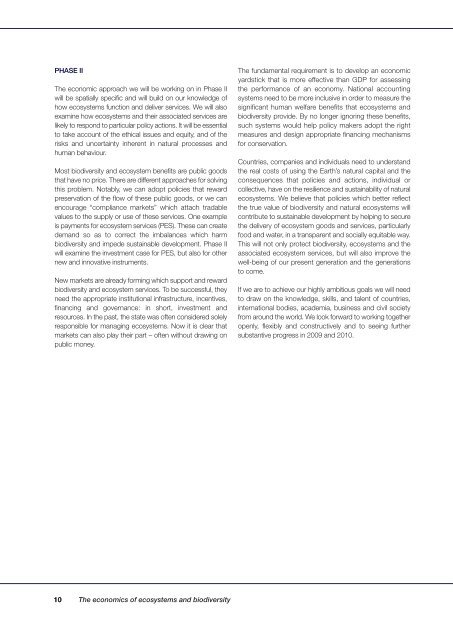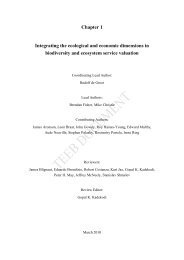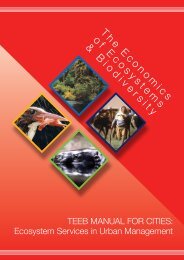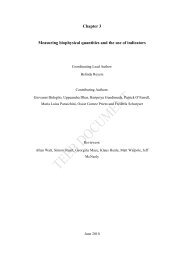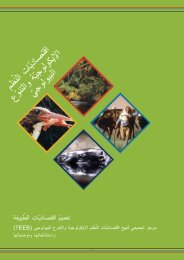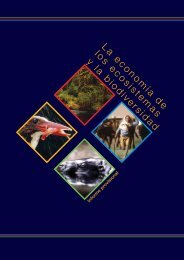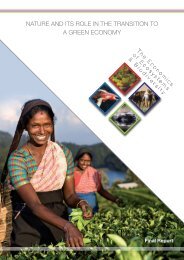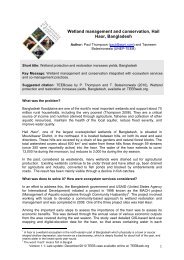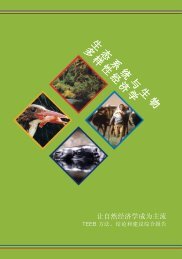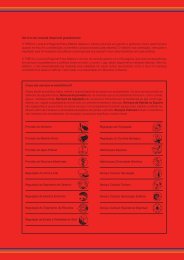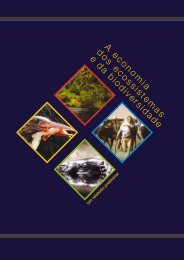Interim Report - TEEB
Interim Report - TEEB
Interim Report - TEEB
You also want an ePaper? Increase the reach of your titles
YUMPU automatically turns print PDFs into web optimized ePapers that Google loves.
PHASE II<br />
The economic approach we will be working on in Phase II<br />
will be spatially specific and will build on our knowledge of<br />
how ecosystems function and deliver services. We will also<br />
examine how ecosystems and their associated services are<br />
likely to respond to particular policy actions. It will be essential<br />
to take account of the ethical issues and equity, and of the<br />
risks and uncertainty inherent in natural processes and<br />
human behaviour.<br />
Most biodiversity and ecosystem benefits are public goods<br />
that have no price. There are different approaches for solving<br />
this problem. Notably, we can adopt policies that reward<br />
preservation of the flow of these public goods, or we can<br />
encourage “compliance markets” which attach tradable<br />
values to the supply or use of these services. One example<br />
is payments for ecosystem services (PES). These can create<br />
demand so as to correct the imbalances which harm<br />
biodiversity and impede sustainable development. Phase II<br />
will examine the investment case for PES, but also for other<br />
new and innovative instruments.<br />
New markets are already forming which support and reward<br />
biodiversity and ecosystem services. To be successful, they<br />
need the appropriate institutional infrastructure, incentives,<br />
financing and governance: in short, investment and<br />
resources. In the past, the state was often considered solely<br />
responsible for managing ecosystems. Now it is clear that<br />
markets can also play their part – often without drawing on<br />
public money.<br />
The fundamental requirement is to develop an economic<br />
yardstick that is more effective than GDP for assessing<br />
the performance of an economy. National accounting<br />
systems need to be more inclusive in order to measure the<br />
significant human welfare benefits that ecosystems and<br />
biodiversity provide. By no longer ignoring these benefits,<br />
such systems would help policy makers adopt the right<br />
measures and design appropriate financing mechanisms<br />
for conservation.<br />
Countries, companies and individuals need to understand<br />
the real costs of using the Earth’s natural capital and the<br />
consequences that policies and actions, individual or<br />
collective, have on the resilience and sustainability of natural<br />
ecosystems. We believe that policies which better reflect<br />
the true value of biodiversity and natural ecosystems will<br />
contribute to sustainable development by helping to secure<br />
the delivery of ecosystem goods and services, particularly<br />
food and water, in a transparent and socially equitable way.<br />
This will not only protect biodiversity, ecosystems and the<br />
associated ecosystem services, but will also improve the<br />
well-being of our present generation and the generations<br />
to come.<br />
If we are to achieve our highly ambitious goals we will need<br />
to draw on the knowledge, skills, and talent of countries,<br />
international bodies, academia, business and civil society<br />
from around the world. We look forward to working together<br />
openly, flexibly and constructively and to seeing further<br />
substantive progress in 2009 and 2010.<br />
10<br />
The economics of ecosystems and biodiversity


